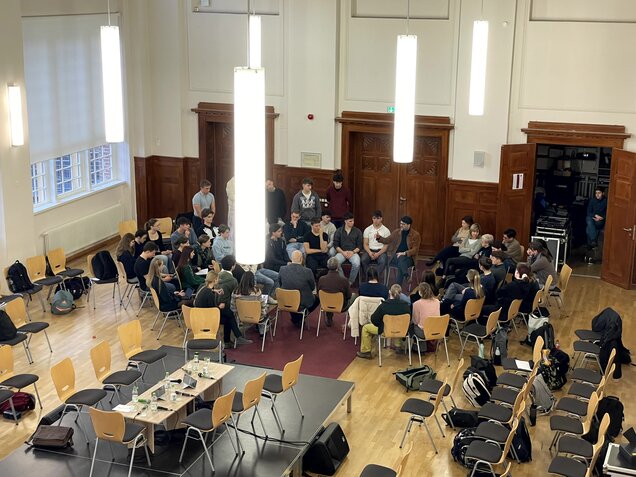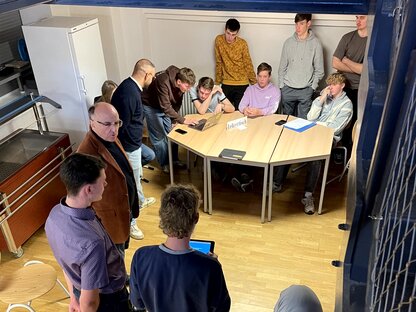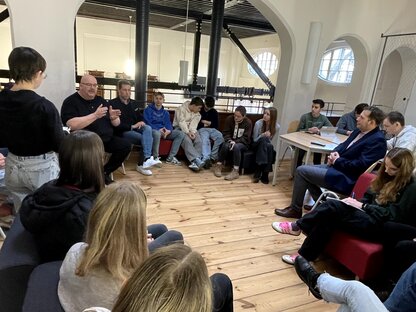Controversial panel discussion: pensions, UBI and migration
A lively and controversial panel discussion on the topics of pensions, unconditional basic income (UBI) and migration brought together representatives from various parties. The event was organized by committed students who made an important contribution to the political discourse with their work.

Topic 1: Pensions
The pension system was one of the central topics of the discussion, with the parties differing significantly in their approaches:
Mr Oest (CDU) emphasized that good education and qualified training were crucial to stabilizing the pension system in the long term. Study courses without clear career prospects were viewed critically.
Mr. Stahn (AfD) rejected the concept of female poverty and pointed out that married couples would share their pensions. He also raised the idea of introducing pension payments for jobs that are controlled by AI and robots.
Mr. Taher Saleh (B90/GREENS) argued for a minimum pension of 1,000 euros to actively combat female poverty and emphasized that more working people - including through immigration - are needed to keep the pension system stable.
Mr. Kosubek (SPD) made it clear that the party was aiming to permanently secure the pension level at 48%.
Mr. Schultze (DIE LINKE) called for a solidary pension system into which everyone - including civil servants and the self-employed - must pay.
Mr. Einsle (FDP) questioned the intergenerational contract and suggested that pensioners could benefit from returns generated by long-term equity investments.
Topic 2: Unconditional basic income (UBI)
Different views clashed on the topic of UBI:
Mr. Oest and Mr. Stahn firmly rejected a UBI. The CDU focused instead on personal responsibility and education, while the AfD referred to existing social benefits and called for a reduction in bureaucracy.
Mr. Taher Saleh saw the UBI as a way to save money through simplified administration and called for a wealth tax for the super-rich.
Mr Kosubek argued that a UBI could reduce the incentive to work and instead emphasized the need to increase the minimum wage.
Mr Schultze saw the UBI as a step towards more security and freedom for people, but pointed out that it was not the only solution to social problems.
Mr Einsle criticized the UBI as unfinanceable. It would cost a trillion euros, which is far beyond the means of the federal budget.
Topic 3: Migration
Migration was probably the most intense debate of the day:
Mr. Oest emphasized the need to differentiate between economic refugees and asylum seekers. Language skills could be learned in the workplace and the German social system should not be overburdened.
Mr Stahn criticized the fact that the system was not designed for the high number of asylum seekers, as there were neither sufficient language courses nor funding. He pointed out that immigration is nothing new historically and reminded the audience of well-integrated workers.
Mr. Taher Saleh emphasized that Germany is a country of immigration. Language courses should be available from day one and the potential of immigrants, for example in the care and medical sectors, should be exploited more.
Mr Kosubek emphasized the importance of the Skilled Immigration Act, but criticized the long bureaucratic processes that make it difficult for immigrants to enter the labour market. Integration does not mean assimilation, but the preservation of cultural diversity.
Mr Schultze denounced the humanitarian crisis at the EU's external borders. Returns to unsafe countries of origin are contrary to human rights and responsibility should not be shifted to Europe's border countries.
Mr Einsle emphasized the importance of a clear distinction between asylum and skilled migration. The existing procedures must be reformed to enable fairer distributions in Europe.
Duel: AfD and the Greens on climate protection and wind turbines
A particularly heated debate broke out between Mr. Stahn (AfD) and Mr. Taher Saleh (B90/The Greens) on the topics of climate change, wind turbines and nuclear power. While Mr. Taher Saleh acknowledged climate change as a real and pressing challenge, Mr. Stahn denied its existence. "The climate has always been changing," said the AfD politician.
The contrast between the two was particularly clear when it came to wind turbines. Mr Stahn criticized the fact that forests were being cut down to make way for them. However, research by the
fact check team revealed that less than 0.01% of forested areas in Germany were used for wind turbines (source: Fachagentur Windenergie an Land). Operators are also obliged to reforest elsewhere - with more climate-resistant plant species. Opinions were also divided on the topic of nuclear power.
Mr. Stahn called for the reactivation of nuclear power plants, while Mr. Taher Saleh vehemently rejected this. Nuclear power plants are dangerous and modernization is far too cost-intensive. Instead, he advocated renewable energies such as wind and solar power. The students present asked many essential questions, which further enlivened the exchange.
Thanks to the organizers
Special thanks go to the dedicated students Kacper Zaba, Connor Wenning, Johanna Hasse, Constantin Schütz, Martha Wiesner, Sandra Ullrich, Tamo Chaintiou and Melika Waezy, who made this panel discussion possible with great commitment and organizational talent. They made an important contribution to the political discourse and showed how essential the exchange on socially relevant topics is.
The panel discussion not only offered exciting insights into the positions of the parties, but also showed how important dialog is for the future of Germany. The intensive participation of the pupils underlines the fact that political engagement is not tied to age.

